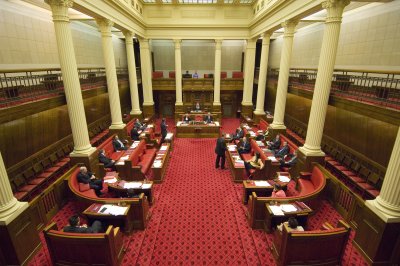IN THE MEDIA
South Australian politicians have made right decision voting against unilateral recognition of Palestine
August 11, 2017 | Eran Lerman

Eran Lerman
The Advertiser – August 11, 2017
THE South Australian Legislative Council passed a motion calling for a two-state solution to the Israeli-Palestinian conflict to be achieved at the negotiating table, reversing an earlier House of Assembly position which had suggested unilateral recognition of Palestine.
This new motion was a positive step – good for peace, good for the Palestinians (even if some of their fanatical supporters think they are doing them a favour by pushing for a non-negotiated outcome) and good for South Australia in particular and for the country at large.
Good for peace, because the extremely complex issues at stake can only be settled at the negotiating table.
The sheer scope of what is to be decided in any peace deal is staggering: security measures, borders, Jerusalem, responding to the needs of people from both sides – Arabs and Jews – who became refugees due to the conflict, economic co-operation, water, and much more.
To presume that any of this can be resolved away from the negotiating table is to undermine any prospects of peace.
Good for the Palestinians, because the fantasy that peace can be imposed, and there is a “Better Alternative to a Negotiated Agreement” (in the language now used in negotiations theory) is a dangerous delusion.
Those who feed it are selling the Palestinian people a dangerous hallucinogenic drug.
Keeping them away from a negotiated solution – from the Zone of Possible Agreement, or ZOPA for short – is ultimately harmful to their future, insofar as it locks them into the prospect of perpetual conflict, rather than lead them toward improving their situation through purposeful negotiations.
Good for South Australia, for Australia and other like minded nations generally – because anyone attentive to the details of what has actually been happening in international affairs recently knows that, contrary to some assertions by Bob Carr and others, to take an anti-Israeli position now is to go against the arc of history, not with it.
African leaders; Israel’s Mediterranean allies, Greece and Cyprus; Prime Minister Modi of India; President Macron of France; the leaders of the East European Visegrad Group – Poland, the Czech Republic, Slovakia and Hungary; Vietnam and the Philippines; Putin in Moscow; not to mention Americans on both sides of the political divide – all attest to Israel’s growing importance as a friend and ally.
Even in the Arab world, countries once loud in their opposition are now learning to benefit from better relations with Israel.
Insofar as there is a role for Australians to play – given that the original lower house resolution should never have been brought forward in the first place – it is by avoiding the traps set by anti-Israeli propagandists and by adopting a firm position in support of closer co-operation and a negotiated peace.
Dr Eran Lerman is former Deputy National Security Adviser to Israel’s Prime Minister and is currently Senior Associate at the Begin-Sadat Centre (BESA) for Strategic Studies
Tags: Australasia





